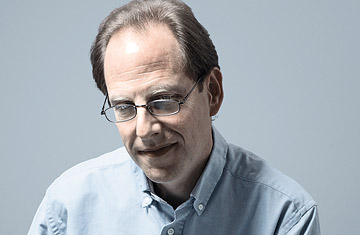
Simon Baron-Cohen of the University of Cambridge is taking a broader view of mating habits and their consequences
In 1999, Brian Hughes, a San Antonio–based tech entrepreneur, discovered that his 13-year-old son, a brilliant boy who had nonetheless struggled socially and in school, had Asperger's syndrome, a mild form of autism. With this revelation, his parents and teachers were better able to meet his needs, and after attending a public high school for gifted children, he followed in his mother's and father's footsteps by attending MIT and then went on to a successful career as a computer programmer.
The story might have ended there, except that shortly after his son's diagnosis, Hughes became president of the MIT alumni association. Heading a career panel at his 25th reunion, he listened, riveted, as the conversation turned in a curious direction: "The chairman of the MIT Corporation told a story of how he could never hold a job, was always insulting people, and how he'd finally given up and started his own company," he recalls. "The next speaker said that he'd just been diagnosed with Asperger's and was just starting to make sense of his life. Next, a successful engineer started saying, 'I don't think like other people. I think in pictures.' Here we were, a randomly selected sample of MIT alums, and we all were on the spectrum."
In 2003, Hughes wrote an article for the MIT alumni website, raising the question of whether "the 'abnormal' condition known as Asperger's syndrome" could be "remarkably similar to the 'normal' functioning of an engineer's mind," and was contacted by dozens of MIT alumni, many married to alums of similar schools, who also had children on the autism spectrum. Were their kids, he wondered, getting a double dose of some kind of autism-causing genes?
Across the Atlantic, Simon Baron-Cohen, director of the Autism Research Centre at the University of Cambridge, had been asking himself some very similar questions about the families who were visiting his clinic. In the late 1990s, he'd come to believe that a common cognitive profile — a tendency toward what he called systemizing (focusing on systems and how they work), combined with noted deficits in empathy, or the ability to relate to and read others — existed both in people with autism and, to a much lesser extent, in many of their relatives. He'd begun to theorize that this sort of brain type would be common in any population that brought people with very strong math, science and tech skills to cluster together — and to think that if these high systemizers were choosing one another as mates, they might be particularly likely to have autistic children.
Baron-Cohen, a psychologist who happens to be a first cousin of comedian Sacha Baron Cohen's, is the U.K.'s leading autism researcher. His flair for such creative if controversial theories has brought him worldwide renown. At an international autism conference in San Diego in May, he was frequently mobbed by fellow attendees and treated with near universal adulation. ("Still cranking out the books and papers?" one middle-aged American academic groused jealously.) His "assortative-mating theory of autism" — the musings that led him to get in touch with Hughes in the early fall of 2003 — is perhaps his most seductive idea.
Assortative mating — or, in common language, the tendency of birds of a feather to flock together — has long been known to play a big role in how people choose their marriage partners. Traditionally, people have assortatively mated, or sorted themselves, by height, socioeconomic standing, religion — and psychiatric profile. People with depression, bipolar disorder, OCD, ADHD, personality disorders and substance-abuse issues are all more likely to marry other people who either have those problems or have family members who do. "People are attracted to each other based on their similarities," says Carol Mathews, a psychiatrist with the UCSF Medical Center who has studied the role of assortative mating in psychiatric disorders. "It's not necessarily a conscious choice."
Baron-Cohen and Hughes approached MIT about surveying its alumni, but the university nixed the project. So Baron-Cohen decided to go ahead with it on his own. He recently launched a survey on his research center's website that aims to poll a wide range of college graduates — not just engineering and science majors — about their occupations, favorite hobbies, talents (things like perfect pitch, unusual memory and musical ability) and possible mental-health diagnoses and then ask similar questions about their children.
Beyond certain familiar links that he expects he may find between, say, engineer parents and children with speech delays, Baron-Cohen, whose wife is a lawyer, says he's intentionally remaining hypothesis-free about what sorts of associations will come to light. "We are also collecting data on dyslexia and ADHD," he says, "but precisely which types of parents are more at risk for having such a child is exactly what we are wanting to discover."
